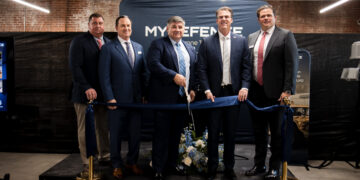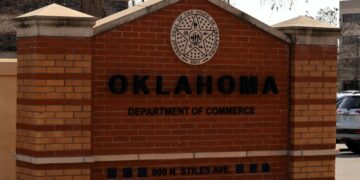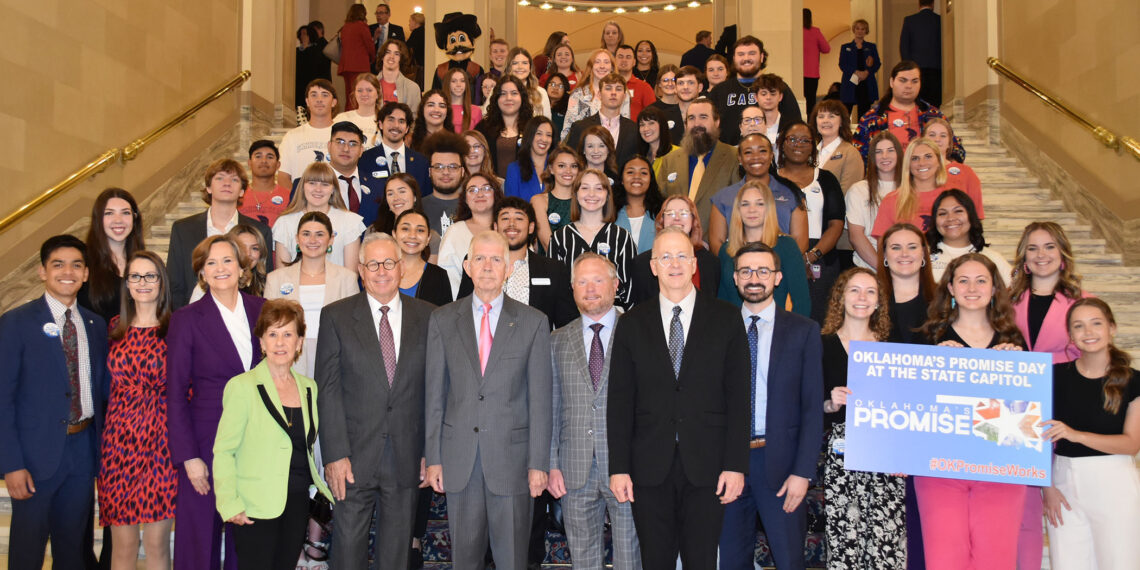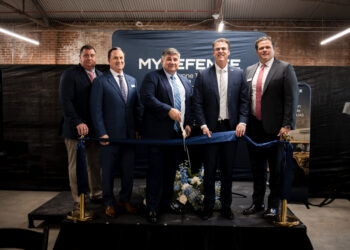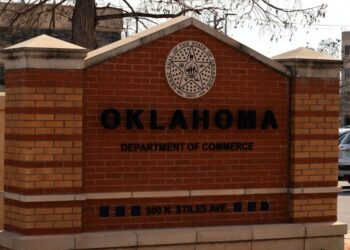OKLAHOMA CITY (OBV) – State leaders, educators and students came together at the Oklahoma State Capitol on Thursday to celebrate Oklahoma’s Promise, a scholarship program that gives college opportunities to students across the state and builds Oklahoma’s future workforce.
An array of leaders from both the legislature and education spoke during the event, including House Democratic Leader Cyndi Munson, D-Oklahoma City, Rep. Arturo Alonso Sandoval, D-Oklahoma City, Oklahoma State Regents for Higher Education Chair Jack Sherry, Chancellor Allison D. Garrett and Chief of Staff Jeff Peters from the Office of Senate President Pro Tempore.
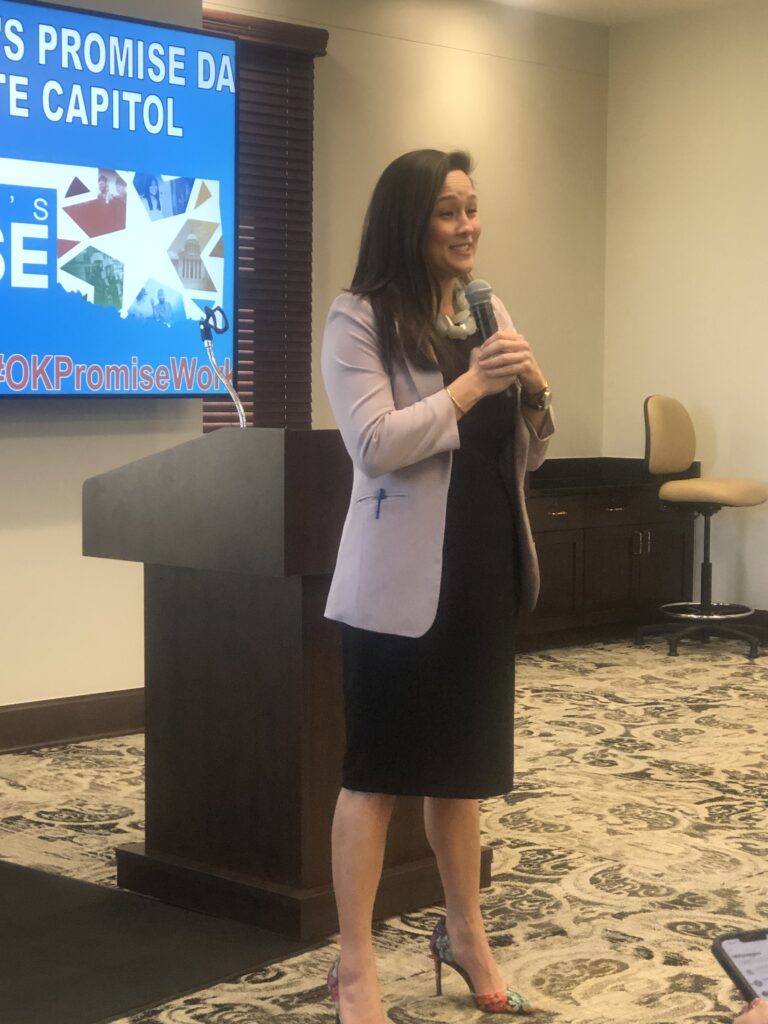
Scores of Oklahoma’s Promise scholarship recipients were also present.
Both Munson and Sandoval received Oklahoma’s Promise scholarships when they were students. They each spoke to the latest scholarship recipients about the opportunities Oklahoma’s Promise afforded them.
“This is what investment looks like when you invest in us. We’re literally giving our lives to serve the state of Oklahoma,” Munson said.
Chelsea Welle, a Mustang High School graduate who is now a freshman at Oklahoma City Community College, was among the Oklahoma’s Promise recipients at the event.
Oklahoma’s Promise made college a possibility for Welle, whose family has faced financial struggles in recent years.
“I got two loving parents, but my mom is disabled and my dad was really doing all the work, only him providing for our income. And then COVID really hit our family,” Welle said. “So, when it came to coming back to school, I was like, ‘Well, I want to go to college, but I don’t really know how.'”
Welle said her high school counselor, Jason Limke, was instrumental in connecting her to Oklahoma’s Promise.
“If it really wasn’t for him, I wouldn’t have known about Oklahoma’s Promise or be able to go to OCCC, or even thinking about going to UCO after I get my associate’s degree,” she said.
Going to college did not seem financially feasible to Welle, but thanks to Oklahoma’s Promise she is able to attend OCCC full time and not worry about fulfilling financial obligations. She is also receiving Pell grants.
Welle is taking diversified studies while dabbling in different electives. She said she grew up studying dance and hopes to work as a dancer and performer across the United States, but plans to ultimately return to Oklahoma to teach special education.
The State Legislature created Oklahoma’s Promise in 1992 to help parents and guardians provide their children a college education.
More than 100,000 Oklahomans have earned the Oklahoma’s Promise scholarship since 1992, helping them pay tuition while preparing them to help grow Oklahoma’s workforce.
Oklahoma’s Promise emphasizes academic readiness while providing financial support for college.
The scholarship covers tuition at all public colleges and universities in the state for five years or until the student receives a bachelor’s degree, whichever comes first. It also pays partial tuition at accredited Oklahoma private institutions or for certain public career technology programs. The scholarship, however, does not cover fees, books or room and board.
“The biggest thing it does is provide funding to students across Oklahoma who may not have the means to attend college. And it just kind of broadens our scope of people that’s able to come to our colleges, universities and ultimately go into the workforce and then bring more jobs and continue growing our economy,” said Dustin Hilliary, a member of the Oklahoma State Regents for Higher Education.
The goal behind the scholarship is to provide student financial support with a hope that they will work in Oklahoma upon completing their higher education, Hilliary said.
“There’s so many jobs that need people in that profession, whether it’s teachers or nurses or engineers, lawyers. There’s a lot of things. And we just need Oklahoma kids to go to our colleges and universities, graduate, stay in Oklahoma and join one of those professions,” he said.
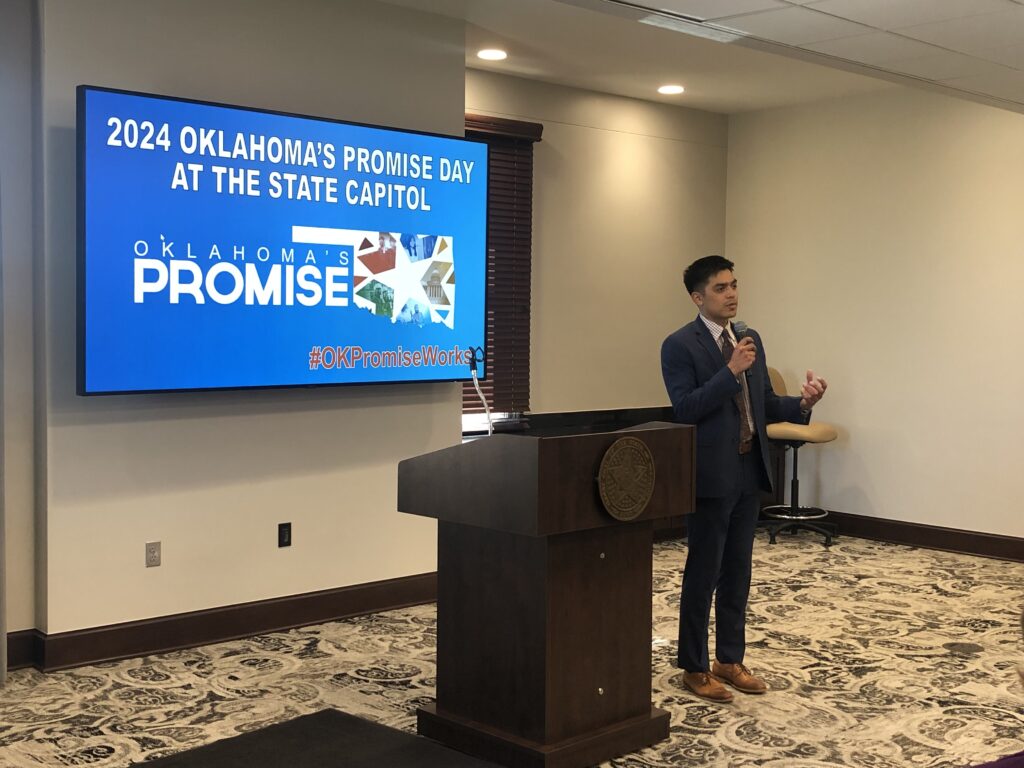
Sandoval, who is the youngest member of the legislature, is a first generation citizen whose hardworking parents immigrated to the United States from Mexico. He earned a degree in mechanical engineering, an accomplishment he said would not have been possible if not for the financial assistance provided to him by Oklahoma’s Promise.
“Being a first-generation high school graduate – and eventually becoming a first-generation college graduate – it was hard to even know how to navigate applying for scholarships, applying to colleges,” Sandoval said. “But through Oklahoma’s Promise, I remember that was one of the first opportunities that I saw. I was like, ‘You know what? Maybe this is something for me.’ And, because after I had applied to Oklahoma’s Promise around my sophomore year of high school, I really started seeing that this is just the beginning of a journey for me to pursue higher ed.”
A support system of Oklahoma’s Promise advisors helped Sandoval along his journey – a journey which he pursued to full fruition in Oklahoma.
“I made my way to OU and studied mechanical engineering. And before I decided to run for office, I had a job lined up as a mechanical engineer for a very good company. But I was going to leave the state, like a lot of young people do,” Sandoval said. “But because I had that connection with the community that I had built through Oklahoma’s Promise and the mentors that had supported me, that same group of leaders and the same people that I had really involved myself with since high school encouraged me to stay in Oklahoma and pursue being a public servant as a state representative.”
Students must enroll in Oklahoma’s Promise between eighth and eleventh grade and achieve a minimum 2.50 GPA in 17 core, college prep courses and an overall 2.50 GPA or better for all ninth through twelfth grade courses.
Income level cannot exceed $60,000 for families with one to two dependent children, $70,000 for families with three to four dependent children or $80,000 for families with five or more dependent children.
Once the Oklahoma’s Promise student is in college, they must attend class regularly, stay out of serious trouble and avoid drugs and alcohol. Also, their family income cannot exceed $100,000 for the year of college enrollment.
Oklahoma’s Promise program students often succeed in their high school academics, earning a 3.47 average GPA (exceeding the state average), achieve high ACT scores that surpass non-Oklahoma’s Promise students’ scores and perform well in their college freshman classes. Over 92 percent of Oklahoma’s Promise students remain and work in Oklahoma after college and more than 90 percent are still working in the state five years later, a higher average than non-Oklahoma’s Promise students.
The college-going rate of Oklahoma’s Promise students exceeds the state average for high school graduates. They also have above-average full-time college enrollment, persistence and degree-completion rates. In addition, Oklahoma’s Promise college graduates are employed and remain in Oklahoma after college at a higher rate than non-Oklahoma’s Promise graduates. More than 92 percent of Oklahoma’s Promise graduates remain and work in the state one year after graduation, and over 90 percent are still employed in the state five years later.




